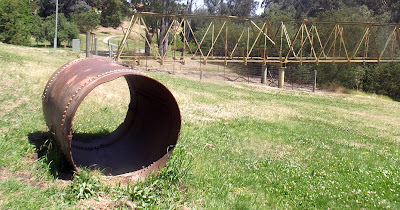 |
| Base of the Bridge |
 |
| The Bridge |
 |
| The Bridge and section of original pipe |
On November 28 2012 I hiked the remote section of the Plenty River Trail, adjacent to the Plenty Gorge Parklands - about 2.5 km return, in Greensborough North.
 |
| Hiker and hounds on the concrete section of Trail |
A marker at the bottom of a very steep 50 metre concrete link-path from Punkerri Circuit, between houses, states that the Trail ends at this point. This path is almost perpendicular and requires acrobatic skills to negotiate! A winch would have been useful- too steep for me, so I clambered down and back in scrubby grass.
 |
| The Bridge in the 1890s |
 |
| Visitor having a rest and cool drink under the Bridge |
The Pipe Bridge is 210 feet long, divided into 4 spans. The main girders are light lattice 11 feet deep and 11 ft 4 inches apart. The bridge carried two wrought iron tubular mains, 53 inches in diameter, supported at intervals by cross girders and chairs, placed between the main girders.
The bridge is carried on braced cast-iron columns, 18 inches in diameter, set on concrete foundations, with a clear headway of 20 feet above the Plenty River. The eastern side of the bridge is reinforced with a bluestone abutment at the river bank.
 |
| The Bridge in 1977 |
A section of the original pipe remains on-site near the Bridge.
Nearby is a plaque marking the location of a private cemetery for the pioneer Whatmough and Partington families.
A NOTABLE APPLE TREE
(This story is acknowledged, in part, to The Leader newspaper, April 9, 1910, from Museum Victoria. Imperial measurements have been retained!)
I
 |
| The Apple Tree |
What is probably the oldest apple tree in Victoria, in the orchard of Mr. Bosch. The tree was one of two purchased from Mr John Batman, and planted in 1838 by Mr. Flintoff.
 |
| The Appletree in 1910 |
In 1851 the tree yielded 42 bushels.
Around 1890, the tree was cut back and grafted with the Rhymer variety of apple. In 1910 it was laden with fruit, and was expected to yield from 25 to 30 bushels, not withstanding that one large limb has been broken off by the weight of fruit.
(Note: 1 imperial bushel = 8 imperial gallons ≈ 36.3687 litres ≈ 2219.36 cu in)
Click here to see an Album of all of the Photos of my visit!


No comments:
Post a Comment